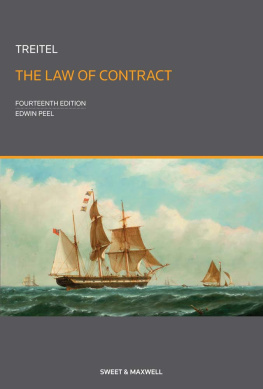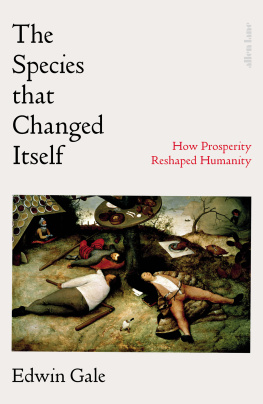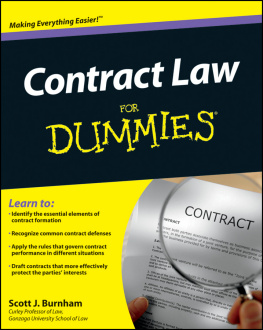Edwin Peel - Treitel on The Law of Contract
Here you can read online Edwin Peel - Treitel on The Law of Contract full text of the book (entire story) in english for free. Download pdf and epub, get meaning, cover and reviews about this ebook. publisher: Sweet & Maxwell - M.U.A, genre: Romance novel. Description of the work, (preface) as well as reviews are available. Best literature library LitArk.com created for fans of good reading and offers a wide selection of genres:
Romance novel
Science fiction
Adventure
Detective
Science
History
Home and family
Prose
Art
Politics
Computer
Non-fiction
Religion
Business
Children
Humor
Choose a favorite category and find really read worthwhile books. Enjoy immersion in the world of imagination, feel the emotions of the characters or learn something new for yourself, make an fascinating discovery.
- Book:Treitel on The Law of Contract
- Author:
- Publisher:Sweet & Maxwell - M.U.A
- Genre:
- Rating:5 / 5
- Favourites:Add to favourites
- Your mark:
- 100
- 1
- 2
- 3
- 4
- 5
Treitel on The Law of Contract: summary, description and annotation
We offer to read an annotation, description, summary or preface (depends on what the author of the book "Treitel on The Law of Contract" wrote himself). If you haven't found the necessary information about the book — write in the comments, we will try to find it.
Treitel on The Law of Contract — read online for free the complete book (whole text) full work
Below is the text of the book, divided by pages. System saving the place of the last page read, allows you to conveniently read the book "Treitel on The Law of Contract" online for free, without having to search again every time where you left off. Put a bookmark, and you can go to the page where you finished reading at any time.
Font size:
Interval:
Bookmark:

Fourteenth Edition
EDWIN PEEL, B.C.L., M.A.
Professor of Law
Clarendon Harris Fellow in Law, Keble College, Oxford
Barrister, One Essex Court

First Edition 1962
Second Edition 1966
Third Edition 1970
Fourth Edition 1975
Fifth Edition 1979
Sixth Edition 1983
Seventh Edition 1987
Eighth Edition 1991
Ninth Edition 1995
Tenth Edition 1999
Eleventh Edition 2003
Twelfth Edition 2007
Reprinted 2010
Thirteenth Edition 2011
Fourteenth Edition 2015
Published in 2015 by Thomson Reuters (Professional) UK Limited trading as Sweet & Maxwell, Friars House, 160 Blackfriars Road, London, SE1 8EZ (Registered in England & Wales, Company No 1679046.
Registered Office and address for service: 2nd floor, 1 Mark Square, Leonard Street, London EC2A 4EG)
For further information on our products and services, visit www.sweetandmaxwell.co.uk
Typeset by Letterpart Limited, Caterham on the Hill, Surrey, CR3 5XL.
Printed and bound in Great Britain by CPI Group (UK) Ltd, Croydon, CR0 4YY
A CIP catalogue record of this book is available for the British Library.
Thomson Reuters and the Thomson Reuters logo are trademarks of Thomson Reuters.
Sweet & Maxwell is a registered trademark of Thomson Reuters (Professional) UK Limited.
Crown copyright material is reproduced with the permission of the Controller of HMSO and the Queens Printer for Scotland.
All rights reserved. No part of this publication may be reproduced, or transmitted in any form, or by any means, or stored in any retrieval system of any nature, without prior written permission, except for permitted fair dealing under the Copyright, Designs and Patents Act 1988, or in accordance with the terms of a licence issued by the Copyright Licensing Agency in respect of photocopying and/or reprographic reproduction. Application for permission for other use of copyright material, including permission to reproduce extracts in other published works, shall be made to the publishers. Full acknowledgement of the author, publisher and source must be given.
2015 G.H. Treitel
In the four years since the last edition the more significant changes in the law have been the result of legislation rather than decisions of the courts. The most significant of such developments have been the amendments made to the Consumer Protection from Unfair Trading Regulations 2008 and the passing of the Consumer Insurance (Disclosure and Representations) Act 2012, the Insurance Act 2015 and the Consumer Rights Act 2015.
At the time of writing, neither of the two Acts of 2015 are yet in force. Most of the changes to the law introduced by the Insurance Act 2015 will come into force on 12 August 2016 and affect the duties of disclosure and liability for misrepresentation of insureds. They are therefore anticipated in various parts of Ch.9, which also includes the changes already made by the 2012 Act.
The timing of the Consumer Rights Act 2015 created a particular dilemma. It only received royal assent a few weeks before this edition had to be submitted for publication and it is understood that it will come into force in October 2015. However, for several years at least, and certainly for the duration of this edition, the courts are more likely to be required to consider contracts which were entered into under the law as it currently stands. Given the extensive changes introduced by the 2015 Act, in terms of where the law is to be found if not always in terms of substance, it is covered by way of a separate chapter which can be consulted if the 2015 Act is applicable. In other chapters, most notably Ch.7, the current law is stated but the reader is alerted, where appropriate, to the changes that will be introduced by the 2015 Act; so, for example, Ch.7 still covers the Unfair Terms in Consumer Contracts Regulations 1999, but they will be revoked and replaced by provisions in Part 2 of the Consumer Rights Act 2015. Once the date upon which the 2015 Act is in force is known, it is hoped that, by reference to the date when the contract in hand has been entered, it will be possible for the reader to locate the applicable law.
The amendments made to the Consumer Protection from Unfair Trading Regulations 2008 have resulted in civil remedies for consumers who have been the victims of certain prohibited practices, including misleading action and aggressive practice. These changes are reflected in Chs 9 and 10.
If the more significant developments have taken place in Parliament, this is not to say that the courts have been quiet. In the last edition, Ch.6 took into account the decision of the Court of Appeal on the limits of purposive interpretation in Rainy Sky SA v Kookmin Bank and it now assesses the reversal of that decision by the Supreme Court. It must be a source of some regret that the defence of illegality should have been considered by the Supreme Court on three occasions (Allen v Hounga; Les Laboratoires Servier v Apotex Inc;and Jetivia SA v Bilta (UK) Ltd) and yet it still was observed by Lord Neuberger, on the last of these occasions, that the proper approach to the defence of illegality needs to be addressed by this court (certainly with a panel of seven and conceivably with a panel of nine Justices) as soon as appropriately possible. The continued uncertainty in this notoriously knotty territory (Sir Robin Jacob in ParkingEye Ltd v Somerfield Stores Ltd) is reflected in Ch.11. In Geys v Socit Gnrale a majority of the Supreme Court endorsed the view long held in this book that a contract, including a contract of employment, is not automatically terminated by a repudiatory breach (see Ch.18) and in Benedetti v Sawiris the Court provided welcome clarification on the valuation of services provided pursuant to a failed contract (see Ch.22).
In the Court of Appeal, the decisions in Makdessi v Cavendish Square Holdings BV and ParkingEye Ltd v Beavis have invigorated the debate about the scope of the rule against penalties, as has the decision of the High Court of Australia in Andrews v ANZ Banking Group Ltd to return to its equitable origins and reject the limitation of its application to sanctions imposed only for a breach of contract by the payer. All three decisions are assessed in Ch.20 and the appeals to the Supreme Court in Makdessi and ParkingEye represent the more eagerly anticipated of the decisions which will need to be reflected in the next edition. Mention might also be made of the decision of the Court of Appeal in Daventry District Council v Daventry & District Housing Ltd. The observations of the Lords Justices in that most unusual of cases, along with those of many other judges, have called into question the suggested approach of Lord Hoffmann in Chartbrook v Persimmon Homes Ltd to claims for rectification on the basis of common mistake. This debate is considered in Ch.8.
At first instance, there have been several intriguing developments. Most notable among them is the decision of Leggatt J. in Yam Seng Pte Ltd v International Trade Corp Ltd to acknowledge the existence of a duty to perform a contract in good faith, based on the methodology of terms implied in fact. That has received something of a mixed reception, but it is a development which looks like it is here to stay and it is assessed in Chs 1 and 6. In part prompted by the decision in
Next pageFont size:
Interval:
Bookmark:
Similar books «Treitel on The Law of Contract»
Look at similar books to Treitel on The Law of Contract. We have selected literature similar in name and meaning in the hope of providing readers with more options to find new, interesting, not yet read works.
Discussion, reviews of the book Treitel on The Law of Contract and just readers' own opinions. Leave your comments, write what you think about the work, its meaning or the main characters. Specify what exactly you liked and what you didn't like, and why you think so.













